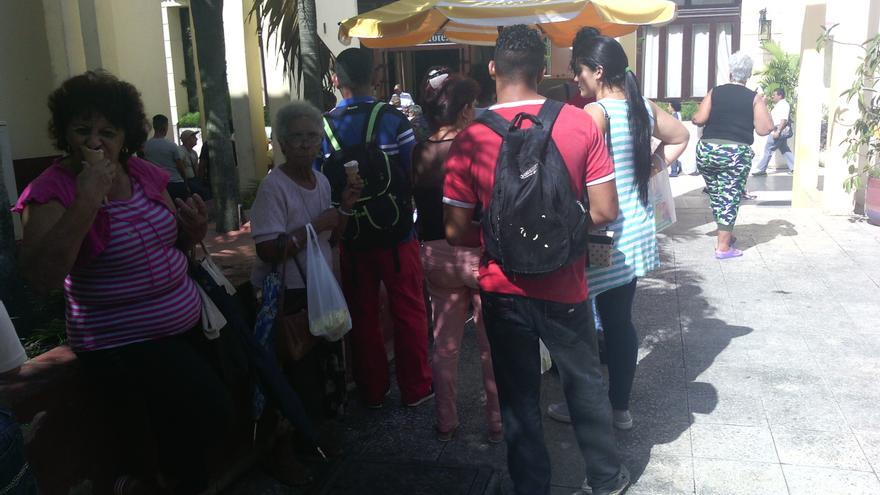
![]() 14ymedio, Madrid, 16 April 2018 — On the occasion of the transfer of power that will take place this Thursday in Cuba, the independent human rights organization, Amnesty International, has prepared a “road map” with the title Transform Confrontation into Dialogue in which it draws up a series of recommendations for the new Cuban executive to improve the situation of rights and freedoms on the Island.
14ymedio, Madrid, 16 April 2018 — On the occasion of the transfer of power that will take place this Thursday in Cuba, the independent human rights organization, Amnesty International, has prepared a “road map” with the title Transform Confrontation into Dialogue in which it draws up a series of recommendations for the new Cuban executive to improve the situation of rights and freedoms on the Island.
Amnesty International emphasizes that, as an independent organization, it does not intend to take a position on the country’s political or economic system, but rather to promote progress in the situation of human rights. The NGO believes that the change in the presidency represents a “historic opportunity” to engage in a constructive dialogue and address pending challenges.
“The government must not squander this opportunity to usher in a new era of respect for human rights. Through dialogue with all sectors of Cuban society, including human rights organizations, independent trade unions, journalists and other civil society groups, authorities must guarantee the rights of all Cubans, including those who are critical of the government. This must include putting a swift end to censorship, bringing its criminal justice system in line with international standards, and tackling all forms of discrimination,” said Erika Guevara Rosas, Amnesty International’s Director for the Americas.
The organization has been refused entry into Cuba for 30 years, but has managed to document “the ongoing detention, harassment and intimidation of activists and independent journalists” in recent months, and has identified at least 11 prisoners of conscience “detained solely for their peacefully held beliefs.”
In its agenda for human rights for Cuba, Amnesty International finds the greatest challenges in the area of pending human rights and proposes five key action areas with 15 concrete measures. The proposals that appear in the document are:
1. Ratify key human rights treaties and allow independent monitors to visit Cuba.
Ratify, without delay, the International Covenant on Civil and Political Rights and the International Covenant on Economic, Social and Cultural Rights, and implement them fully into national law.
Ratify, without delay, the International Covenant on Civil and Political Rights and the International Covenant on Economic, Social and Cultural Rights, and implement them fully into national law.
2. Embrace dialogue with all sectors of Cuban society and allow plurality of voices.
Create spaces to allow for meaningful participation of people belonging to independent civil society, human rights defenders, and alternative trade unions, especially those critical of the government, to receive their feedback on proposed policies and laws.
Establish a regime of simple notification for the registration of associations, including human rights organizations, independent trade unions, and other civil society groups, and ensure that people working in unregistered associations are not criminalized.
Engage in consultation to reform the constitution and other laws regulating the media to allow for independent and critical views to be reported on, and allow journalists to work freely without fear of reprisals.
Pass laws that guarantee access by the public to information held by the government, to increase transparency and facilitate an informed public debate about policy development and decision-making.
Prohibit discrimination based on political or other opinion in hiring, promotion and termination of employment in the public and private sector, and comply with the International Labour Organization Conventions which Cuba has ratified.
3. Stop undermining the right to education through censorship and discrimination.
Prevent discrimination in access to education, in particular based on political opinions.
Guarantee universal access to uncensored Internet, a vital educational tool and catalyst for free expression.
4. Promote equality and prevent discrimination
Continue anti-bullying campaigns and programs promoted by CENESEX in schools to guarantee LGBTI youth access to education free from discrimination.
Become the first independent nation in the Caribbean to legalize same-sex unions, and ensure adequate consultation with LGBTI activists in development of legislation which facilitates this.
Consult with civil society to develop comprehensive anti-discrimination legislations which protect against stigma, discrimination and violence against marginalized and vulnerable groups.
5. Strengthen the independence of the judiciary and bring criminal laws in line with international laws and standards.
Ensure that lawyers are able to perform their professional functions without intimidation, hindrance, harassment or improper interference, and that they are not threatened with prosecution or administrative, economic or other sanctions for any action taken in accordance with their professional duties, in accordance with the UN Basic Principles on the Role of Lawyers.
Amend provisions of the Penal Code, such as those on “dangerousness”, that are so overly broad and vague that they allow for deprivation of liberty when no criminal offence has been committed or where they are applied to unduly restrict the peaceful exercise of human rights.
Abolish the death penalty for all crimes.
________________________________
The 14ymedio team is committed to serious journalism that reflects the reality of deep Cuba. Thank you for joining us on this long road. We invite you to continue supporting us, but this time by becoming a member of 14ymedio. Together we can continue to transform journalism in Cuba.
